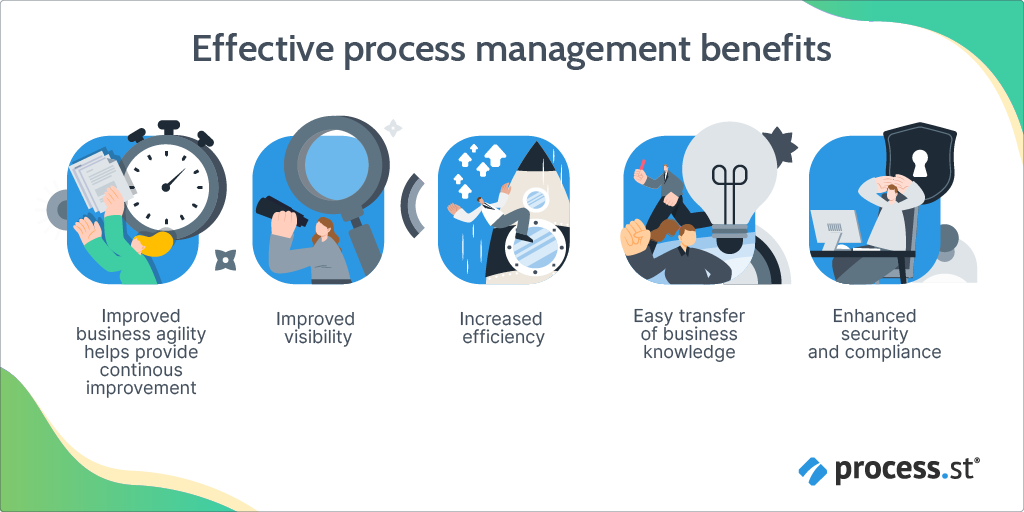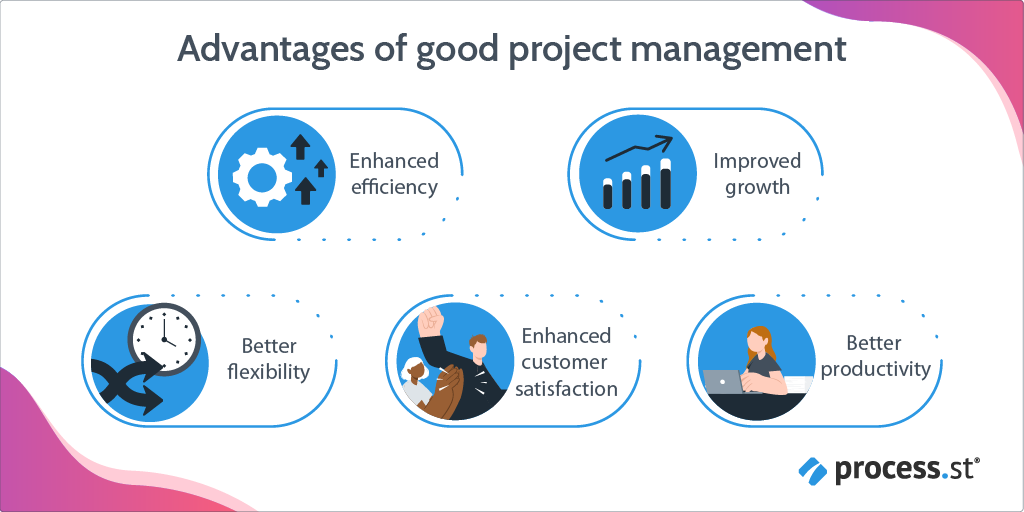
“Project management is a cute way to get started, but serious businesses are committed to process excellence.”
Vinay Patankar, CEO and Co-Founder of Process Street.
I know, that’s a pretty controversial way to start this post, but so is the debate between process vs. project. You’re either Team Process or Team Project.
We’re Process Street and the creators of the Process Manifesto, so our support towards Team Process seems pretty self-evident. But it’s not that simple.
At Process Street, we’re not exclusively using processes. We run projects too.
There’s a time and a place for both process and project management.
But, how do you know when it’s right to opt for process management over project management and vice-versa?
- What is the difference between process and project management?
- Process vs project: How do you know which one to use?
- What are the benefits of process and project management?
- Process vs project: There’s a time and a place
What is the difference between process and project management?
Project management is defined as the plan to organize and deliver a specific project. It’s a great discipline when you don’t encounter the same challenge each day.
During these situations, you’re required to adapt to varied circumstances and calm any chaos.
Process management is the creation of processes that handle challenges first dealt with through project management.
One thing for sure is that they aren’t interchangeable terms. It’s crucial to understand the definition of each and the unique purposes both serve for an organization.
How does project management work?
Project management is typically comprised of five different phases and can be reflected through the project life cycle:
- Project initiation
The conception phase is where project management begins. This is where:
- Ideas are brainstormed
- Research is done
- A plan of possibilities is made
The plans made during project initiation determine whether a project is a worthwhile investment.
- Project planning
During the second stage, you:
- Consider the concerns and requirements of stakeholders
- Establish the goals of this project
- Create a project team
- Formulate a plan for this project
- Project execution
At this point in the project life cycle, the project team begins creating deliverables and puts their plan into action to achieve the goals outlined in the previous phase.
When the team is attempting to achieve these objectives and create deliverables:
- Resources are allocated
- Processes are implemented
- Tasks are assigned
- Project monitoring and controlling
The focus is on progress and performance tracking during the fourth stage. This is where measures are formed to make sure the project is tracked to stay within the budget and meet all deadlines.
- Project closure
The last stage of the project life cycle is where all activities – successful or not – have been completed. Typically, this is when an evaluation is done to improve future projects.
How does process management work?
Process management is all about fine-tuning these varied methods of bringing order to chaos.
If a project needs to be done more than twice, it should fall under process management.
Although each team’s method might look different, here are the typical steps to process maturity:
- Process documentation
What are the recurring tasks your team encounters to deliver a specific outcome? During this documentation phase, you want to write down what you wish to use your process for. From here, you can identify:
- What work needs to be done
- Who is responsible
- When it needs to be done by
- Process implementation
Once your processes have been constructed, it’s time to implement and have your team follow them. This way, your work gets done in the specific way your process has outlined.
Process Street is one tool that can help you build and run these processes for consistent results.
- Process execution
This stage of process maturity looks at how the processes are being run. Team members report on the process’s performance and the results delivered from the work they’ve created.
- Process optimization
Once you’ve run these processes for a set amount of time, you can look at the results they’re producing. You can identify any problems the team has encountered or different approaches that might deliver better results.
This phase is all about improving the existing processes. Your goal is to ensure your process is achieving consistent results.
- Process integration
In the final stage, your business’s core processes should be streamlined and effective. Now you can look at linking things together. That means integrating with other software systems to systematize your organization to provide more agility.
Process vs. project management: How do you know which one to use?
Process and project management can both help boost your team’s work routine and deliver better results. Both of these forms of management allow you to outline what you need to get done and how to do it.
However, if you notice your projects are recurring or continuous, then I’ve got some news for you: Your projects are actually processes.
And that’s problematic because it means you’re not correctly optimizing this work.
When do I need project management?
Projects are incredibly useful. When starting off something for the first time, project management is what you should be using. It’s excellent for the incubation of an idea.
Project management is where a team can come up with the desired outcome and the plan to get this idea to come to fruition. Think of project management as the place your team can go to for the first 3 to 9 months of this idea when figuring things out. That’s it!
If these projects become recurring, it’s time to look at process management.
Why?
Similar to the training wheels on a bicycle, there’s only so much this management program can do before the training wheels are actually keeping you from riding your bicycle to your fastest capacity.
When do I need process management?
When it comes to executing your business’s core activity, you need to apply process management.
Why?
This activity revolves around delivering a service or making and selling a product. That’s the definition of recurring core business activity and makes it a process.
Any other activity you come across in your organization that’s repeatable is a process and should be treated as such. Otherwise, you’re missing out on streamlining and optimizing this work.
What are the benefits of process and project management?
Effective process management benefits

- Enhanced business agility
The state of a business is constantly changing. These changes can come from new regulations affecting part of business activity, the rise of a new competitor, or advancements in technology.
Whatever these might be, changes require a company to respond quickly in order to remain competitive. Effective business process management empowers businesses to pause their processes, make the required adjustments, and swiftly bring these processes back on track.
Process Street is one process management tool that provides users with continuous improvement capabilities. That means changes to existing processes can be made on the fly without breaking any processes that are currently being used. Once these changes are made, they reflect in real-time for any current and future processes.
- Better visibility over company operations
Process management allows businesses to track and monitor the processes they’re running. Running these processes through management software also provides access to everyone in the organization.
From its initiation all the way up to a process’s completion, those involved are updated in real-time. By monitoring each step of the process, managers can better understand the overall activity, helping them make more informed decisions when it comes to running future processes.
- Increased efficiency
Each business wants to make its business processors function more efficiently. An inefficient process costs a company valuable money and time. Identifying how to turn this inefficient process into a streamlined one is difficult.
However, process management systems work to pinpoint where these inefficiencies are within a process and help rectify the issue. Process mapping ensures managers can understand why their processes are running slower, and how they can fix it to become more efficient.
- Easily shareable business knowledge
Sharing business knowledge is difficult, especially when a company starts to scale. More often than not, organizations rely on a specific employee or team to have a thorough understanding of how a process works.
Any changes to the workforce make this a costly, inefficient, and time-consuming model. The knowledge these employees gain is taken with them into retirement or their next role in another company.
Efficient process management encourages teams to create well-documented processes, which record this company knowledge and provide an easily shareable solution.
- Ensured security and compliance
The regulations and rules that affect business productivity can cause costly fines and unnecessary disruptions. When there’s a focus on process management, companies are given the opportunity to create a more compliant workplace when it comes to changing regulations.
This is largely due to each phase of the process being mapped and documented. Documentation that includes a workflow, users, and managers to ensure all necessary information is set to meet these compliance requirements.
- More opportunities for continuous improvement
Continuous improvement is a method of making a business more successful through a series of small and ongoing improvements. This is opposed to building organizational success through a sudden top-to-bottom change.
Process management gives managers the ability to look at their various processes, pinpoint ways of refining, and adapt to provide this continuous improvement. Process management tools ensure that informed decisions are made around these incremental changes, as data is collected through the software’s analytics and reports.
Advantages of good project management

- Better product productivity rate
Good project management provides better productivity. Projects are better planned to meet the specific needs of the organization and fit within the budget. This automatically makes the projects completed by the company more productive.
- Encouraged product development
Proper project management encourages organizational growth. When providing this management to your team, work is performed better. Performing well when capitalizing on these new opportunities can help to expand a business’s project portfolio.
- Enhanced project efficiency rate
Good project management enhances the project’s efficiency. A clear roadmap of what the project entails helps to guide those involved in its execution. When these activities are carried out the way they had been planned, it allows teams to work smarter rather than harder.
- Greater customer satisfaction rate
When a project is planned well, the employees responsible for its execution know what to do and how to do it. This clear direction ensures they’re delivering the expected results. Your project is completed at the expected time and within the set budget, which promotes customer satisfaction.
Process vs project: There’s a time and a place
Process always gets the short end of the stick when it comes to managing a business, despite being the organization’s backbone.
The secret behind running a successful team? Process. But you wouldn’t say so because no recognition is ever given.
Project is the one that takes all the praise. It’s the air-headed golden boy of the family while process is the quiet, less interesting sister who goes unnoticed as the glue holding the whole family together (you’ve seen the movies).
Given the wild popularity of projects, businesses often believe they’re running best when these are their central focus. The majority of any business’s work is executing its core activity.
That revolves around making and selling a product or delivering a service. And what does that mean? Recurring work, right?
Process.
But that doesn’t mean project management is problematic. It’s overused, which leads to company processes being treated as projects.
Knowing when to apply process management and when it would be best to use project management is what will give your organizational management the edge you need to succeed.
What do you think is more important: project management or process management? Let’s battle it out in the comments below!







 Workflows
Workflows Forms
Forms Data Sets
Data Sets Pages
Pages Process AI
Process AI Automations
Automations Analytics
Analytics Apps
Apps Integrations
Integrations
 Property management
Property management
 Human resources
Human resources
 Customer management
Customer management
 Information technology
Information technology



Grace Donaldson
Grace is a content writer with a thirst for knowledge and coffee. You'll find her reading in a small café or singing at a rundown jazz bar when she's not overconsuming coffee or compartmentalizing her thoughts into a blog post.